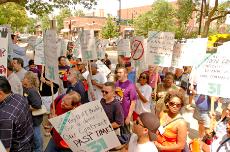Union ‘guardedly optimistic’ about upcoming talks

Protestors from, and in support for, Local Union 698 rally in front of the Lester H. Swanlund Administration Building at 601 E. John St. in Champaign, Thursday, June 29th, at noon. Local Union 698 represents several workers throughout the University from Beck Diefenbach
August 1, 2006
Federal mediations between members of the American Federation of State, County and Municipal Employees Local 698 and the University will continue into next week since no contractual agreement has been reached at this time. The two groups, who entered into federal mediation on July 25 in hopes of producing a new contract, will convene again for a second meeting scheduled on August 10.
“We are guardedly optimistic,” Vice President of Local 698 Margaret Lewis said concerning the negotiation progress.
Lewis, a union member for 12 years and vice president since January, said Local 698 was pessimistic at the onset but is pleased that a second meeting has been planned.
“We are happy to be talking with them,” Lewis said.
In spite of the progress, the union is still cautious about future negotiations and their outcome.
Get The Daily Illini in your inbox!
“We’re still very concerned that we are a long way apart and we are encouraged that another meeting is set up but we need to keep making progress,” Lewis said. “We’re hopeful but we really need to have progress. We’ll see what they do.”
Before entering into mediations, the University offered Local 698 a three-year contract it considered to be its best and final offer. As a result, the University requested that the union put forward a counterproposal, which it did during the July 25 meeting. The mediator was brought up to speed on the situation during the July meeting, as well.
“Right now we are analyzing (Local 698’s) proposal and will be prepared to respond to it when we meet again,” University spokeswoman Robin Kaler said.
Both groups declined to discuss the specifics of the proposal.
Federal mediation, a voluntary process first proposed by the University, employs a neutral third-party as a facilitator from the Federal Mediation and Conciliation Service. The mediator assists the bargaining process in various ways by floating ideas or building trust between conflicting sides to reach their ultimate goal: a mutually agreeable deal.
“Usually mediation is an oral process through the mediator, not exchanges of paper proposals,” Joe Berry said, an adjunct labor education specialist at the Chicago Labor Education Program.
With two large strikes in 2004 at Northeastern Illinois University and City Colleges of Chicago and other labor disputes across the state, the current situation is not foreign to Illinois.
“I think its definitely a reflection of the increased resistance by employers to bargain contracts that are felt to be acceptable by employees,” Berry said. “Most of these conflicts have been defensive on the part of the union.”
When or if the mediations in this case will produce a contract is unknown and, according to Berry, there is no definite time line governing the process.
“It can go on as long as the parties feel its necessary to have a mediator involved and as long as the mediator feels it necessary to be involved,” Berry said. “There are very few parameters for mediation.”
Kaler said the University is focusing in on the here and now to undo the deadlock.
“We’re really focused now on working with the mediation process to come up with best contract possible,” Kaler said. “And we aren’t looking any further than that.”
If federal mediation were to fail, there are still other options for the two groups, namely an extension of the current contract, a return to old collective bargaining or negotiations in different settings.
Berry said he hopes in the end the contract dispute can be resolved.
“I would certainly hope there’s an agreement reached that people can live with,” Berry said. “But of course that’s a hope that remains to be seen.”






